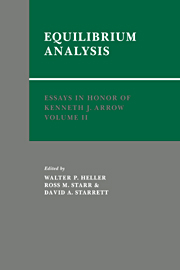Book contents
- Frontmatter
- Contents of Volumes I, II, III
- List of contributors
- Editors' preface
- Kenneth J. Arrow
- Contents
- PART I GENERAL EQUILIBRIUM
- 1 A general equilibrium theory of North–South trade
- 2 Soldiers of fortune?
- 3 The dynamics of industrywide learning
- 4 Decentralized trade in a credit economy
- 5 Lump-sum taxes and transfers: public debt in the overlapping-generations model
- 6 Coordination failure under complete markets with applications to effective demand
- PART II MICROFOUNDATIONS OF MACROECONOMICS
- Author index
6 - Coordination failure under complete markets with applications to effective demand
Published online by Cambridge University Press: 25 October 2011
- Frontmatter
- Contents of Volumes I, II, III
- List of contributors
- Editors' preface
- Kenneth J. Arrow
- Contents
- PART I GENERAL EQUILIBRIUM
- 1 A general equilibrium theory of North–South trade
- 2 Soldiers of fortune?
- 3 The dynamics of industrywide learning
- 4 Decentralized trade in a credit economy
- 5 Lump-sum taxes and transfers: public debt in the overlapping-generations model
- 6 Coordination failure under complete markets with applications to effective demand
- PART II MICROFOUNDATIONS OF MACROECONOMICS
- Author index
Summary
Introduction
Arrow (1969) refined the idea [implicit in Meade (1952), for example] that missing markets were at the foundation of market failure in perfectly competitive economies. He also advanced the notion that nonexistence of complementary markets could explain why economic agents might have no incentive to open missing markets. Heller and Starrett (1976) developed the idea that the nonexistence of complementary markets could be mutually reinforcing, thereby providing a more complete explanation for the nonexistence of markets. Hart (1980) and Makowski (1980) give fairly general treatments of these ideas in the context of product innovation.
In this essay, I show that even when all markets exist, there can be a coordination failure of a type similar to that which occurs with missing markets. There is no missing market here, nor is there any element of uncertainty or time. Instead, there are multiple, Pareto-ranked equilibria in a simple general equilibrium model with a noncompetitive sector. There is, of course, a Pareto inefficiency that results from imperfect competition, but there are additional inefficiencies of the same type that arise in a modified Prisoners' Dilemma game: There is no incentive for any player to unilaterally change his strategy to that associated with a Pareto-superior equilibrium, but coordination among agents could move the economy to the superior equilibrium. Strictly because of noncompetitive behavior, there is also incentive for the players to move away from a Pareto-efficient allocation (viz., the Walrasian allocation).
- Type
- Chapter
- Information
- Essays in Honor of Kenneth J. Arrow , pp. 155 - 176Publisher: Cambridge University PressPrint publication year: 1986
- 19
- Cited by



